VA ECHSC Research Day
VA ECHCS Research Day
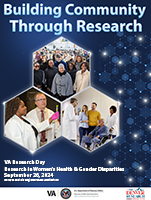
This year's theme was "Building Community Through Research: Research in Women's Health & Gender Disparities." We believe we made great strides in building this community at VA Eastern Colorado Health Care System. Out turnout from Veterans, caregivers, fellow researchers and clinician was remarkable. Almost 60 posters were on display up and down the concourse.
Top Posters
Veteran Engagement in Research – Partnering to Identify Patient-Reported Outcomes to Improve Care, Promote Healing (click the image to enlarge):
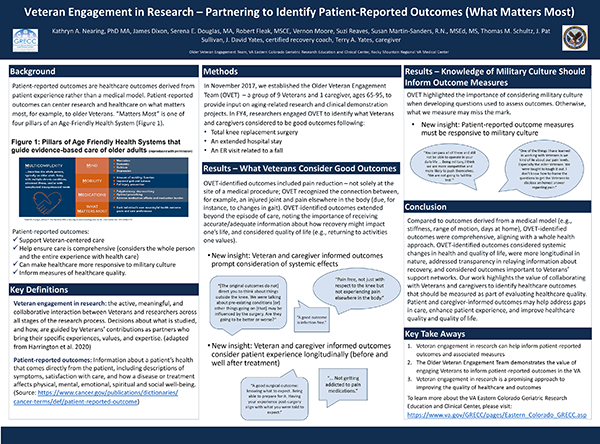
Background: Patient-reported outcomes (PROs) are healthcare outcomes derived from patient experience rather than a medical model. PROs can center research and healthcare on what matters most, for example, to older Veterans. “Matters Most” is one of four pillars of an Age-Friendly Health System.
Methods: In November 2017, we established the Older Veteran Engagement Team (OVET) – a group of 9 Veterans and 1 caregiver, ages 65-95, to provide input on aging-related research and clinical demonstration projects of the VA Eastern Colorado Geriatric Research Education and Clinical Center (GRECC). Researchers have engaged OVET to identify PROs in relation to topics ranging from fall prevention to recovery from total knee replacement surgery to post-acute care.
Results/Outcomes: OVET-identified PROs included pain reduction – not solely at the site of a procedure but also systemically, as OVET recognized the connection between, for example, an injured joint and pain elsewhere in the body (due, for instance, to changes in gait). OVET-identified PROs extended beyond the episode of care (e.g., receiving accurate/adequate information about how recovery might impact one’s life) and considered quality of life (e.g., returning to activities one values). Finally, OVET-identified PROs included desired changes for caregivers, such as reduced caregiver burden.
Conclusions: Compared to outcomes derived from a medical model (e.g., stiffness, range of motion, days at home), OVET-identified PROs were comprehensive, aligning with a whole health approach. OVET-identified PROs considered systemic changes in health and quality of life, were more longitudinal in nature, addressed transparency in relaying information about recovery, and considered outcomes important to Veterans’ support networks.
Implications: Our work highlights the value of collaborating with Veterans and caregivers to identify salient healthcare outcomes. Patient and caregiver-informed PROs may help address gaps in care, enhance patient experience, and improve healthcare quality and quality of life.
First Place - tie
Regulation of Epithelial HIF by Probiotic Escherichia coli (click the image to enlarge):
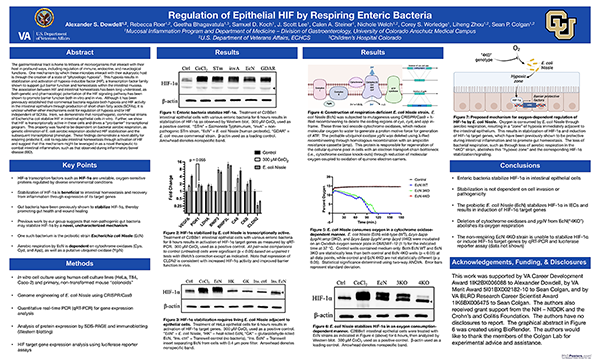
The gastrointestinal tract is home to trillions of microorganisms interacting with their host profoundly, including regulating immune, endocrine, and neurological functions.
One mechanism by which these microbes interact with their eukaryotic host is by creating a state of “physiologic hypoxia.” This hypoxia results in stabilization and activation of hypoxia-inducible factor (HIF), a transcription factor family shown to support gut barrier function and homeostasis in the intestinal epithelium.
The association between HIF and intestinal homeostasis is well understood. The alliance is genetic and pharmacologic, and the potentiation of the HIF signaling pathway promotes barrier function both in vitro and in vivo. Although it was previously established that commensal bacteria regulate both hypoxia and HIF activity in the intestinal epithelium through the production of short-chain fatty acids (SCFAs), it is unclear whether other mechanisms exist for the regulation of hypoxia and HIF independent of SCFAs.
Here, we demonstrate that nonpathogenic, commensal strains of Escherichia coli stabilize HIF in intestinal epithelial cells in vitro. Further, we show that HIF is transcriptionally active in these cells and drives a “pro-barrier” transcriptional program. This property appears dependent on bacterial aerobic respiration, as genetic elimination of E. coli aerobic respiration abolished HIF stabilization and the subsequent transcriptional phenotype.
These findings demonstrate a novel ability for probiotic E. coli to regulate intestinal homeostasis through activation of HIF. The activation might leverage a novel therapeutic to combat intestinal inflammation, such as that observed during inflammatory bowel disease (IBD).
Third Place
Effects of sex and menstrual cycle phase on the neuronal response to food cues in Veterans with overweight/obesity (click the image to enlarge):
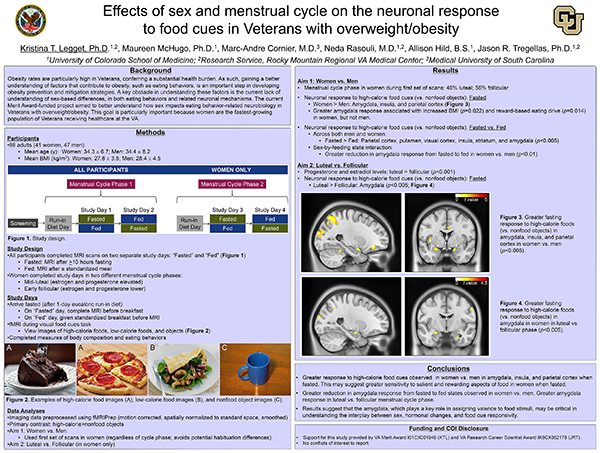
Obesity rates are exceptionally high in Veterans, conferring a substantial health burden. As such, gaining a better understanding of factors contributing to obesity, such as eating behaviors, is vital in developing obesity prevention and mitigation strategies. A key obstacle in understanding these factors is the current lack of understanding of sex-based differences in eating behaviors and related neuronal mechanisms.
The current Merit Award-funded project aimed to understand better how sex impacts eating behavior-related neurobiology in Veterans with overweight/obesity. This goal is essential because women are the fastest-growing population of Veterans receiving healthcare at the VA.
The preliminary analyses involved 88 participants (41 women and 47 men) who underwent functional magnetic resonance imaging (fMRI) and received visual food cues in both fasted and fed states. All women were premenopausal, completing study measures in two phases of their menstrual cycle (early follicular and mid-luteal) in a counterbalanced design. Initial analyses examined the first scanning sessions women completed, regardless of menstrual cycle phase, to assess sex differences while minimizing potential habituation effects.
Findings indicated that women responded more to high-calorie foods (vs. nonfood objects) than men in the amygdala, insula, and parietal cortex (p<0.005) when fasted. As these regions play key roles in valence and reward processing, this may suggest greater sensitivity to rewarding aspects of food in women under fasting conditions. Additionally, a sex*feeding-state interaction revealed a more significant reduction in amygdala response from fasted to fed states in women compared to men (p<0.01). Women also exhibited a more significant amygdala response to high-calorie foods during the luteal compared to the follicular phase (p<0.005).
These results suggest that the amygdala, crucial in assigning valence to food stimuli, may be critical in understanding the interplay between sex, hormonal changes, and food cue responsivity.
Location
VA ECHSC Research Day will be held at Rocky Mountain Regional VAMC (map). The talks will be held in the auditorium and the posters will be setup in the main concourse. The map below shows the layout of the main building and the auditorium highlighted. Entering either entrance from N. Wheeling ST just turn right and you will find the auditorium down towards the south end of the concourse.
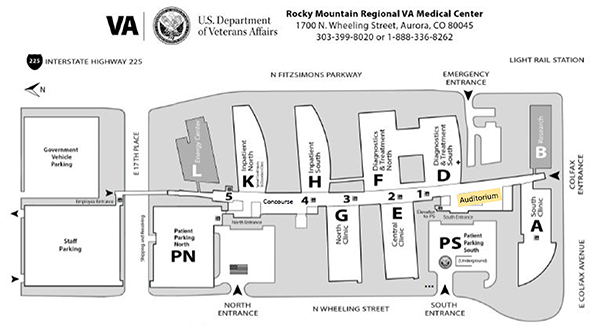
Schedule
| Time | Speaker | Topic |
|---|---|---|
| 8 - 8:10 AM | Dr. Nathan Wlodarchak | Welcoming Remarks |
| 8:10 - 8:20 AM | Dr. Robert Keith/Dr. Pamela Rice | VA ECHSC Research State of the Union |
| 8:20 - 8:30 AM | Dr. Vickie Callahan, MD - VA ECHCS Interim Cheif of Staff | VA Executive Leadership Welcome |
| 8:30 - 9 AM | Dr. Richard Weir & Stephen Huddle, MS | "Durable Finger Prostheses for Women Veterans with Partial Hand Amputation" |
| 9 - 9:30 AM | Dr. Rafael Sobrano Fais | "NLRP signaling in right ventricular failure is sexually dimorphic and regulated by 17β-estradiol via estrogen receptor α" |
| 9:30 - 9:50 AM | Break | Refreshments and snack provided by Denver Research Institute |
| 9:50 - 10:20 AM | Gretchen Stage, MA & Theresa Howes Seattle-Denver COIN |
"Crossing Healthcare Horizons with Veteran Engagement" |
| 10:20 - 10:50 AM | Dr. Lindsey Monteith, PhD Rocky Mountain MIRECC |
"Tailoring Suicide Prevention for Women Veterans" |
| 10:50 - 11:50 AM | Dr. Kerrie Moreau, PhD | VA Keynote Speaker |
| 11:50 AM - 1 PM | Lunch Break | |
| 1:00 - 2:30 PM | Dr. Sonia Kupfer, MD | Dennis J. Ahnen Lectureship "Bridging the Gap in Precision Medicine and Healthcare Equity" |
| 2:30 - 4:00 PM | Poster Session | RMR Concourse |
| 4:00 - 4:15 PM | Dr. Nathan Wlodarchak & Dr. Pam Rice | Announcement of Poster Winners Closing Comments |



















